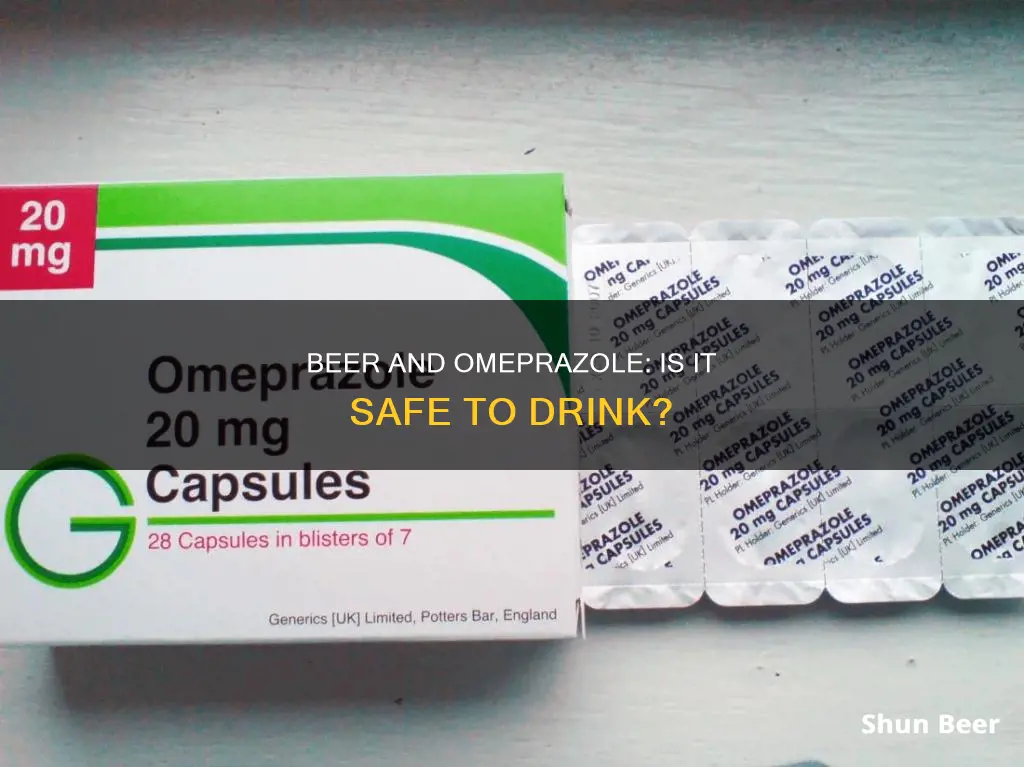
Omeprazole is a medication that reduces stomach acid and treats conditions such as acid reflux and stomach ulcers. While there are no known drug interactions between omeprazole and alcohol, mixing the two can lead to adverse effects. Alcohol can increase the production of stomach acid, which may reduce the effectiveness of omeprazole and worsen symptoms such as heartburn. It is generally advised to avoid alcohol when taking omeprazole, especially for those with a history of ulcers or acid reflux.
| Characteristics | Values |
|---|---|
| Is it safe to mix omeprazole and alcohol? | There are no known drug interactions between omeprazole and alcohol. However, omeprazole can make you feel dizzy and alcohol is likely to make this sensation worse. Alcohol can also worsen heartburn, ulcers, and GERD symptoms. |
| What are the side effects of mixing omeprazole and alcohol? | Alcohol consumption can lead to increased stomach acid production and worsen heartburn symptoms, potentially reducing the efficacy of omeprazole. Alcohol can also cause dehydration and force the lower esophageal sphincter to malfunction, resulting in increased symptoms of acid reflux. |
| What are the dangers of mixing omeprazole and alcohol? | Drinking alcohol while taking omeprazole may increase the frequency and intensity of heartburn, lead to liver injury, and cause magnesium deficiency. |
What You'll Learn

Omeprazole and alcohol do not directly interact
While omeprazole and alcohol do not directly interact, it is still best to avoid drinking alcohol while taking omeprazole. This is because alcohol can worsen symptoms of the conditions omeprazole is used to treat, such as heartburn, ulcers, and gastroesophageal reflux disease (GERD). Alcohol can also increase the frequency and intensity of heartburn by causing an imbalance in the amount of acid that the stomach produces, which can lead to acid reflux.
Omeprazole is a proton pump inhibitor (PPI) that works by reducing the amount of acid the stomach makes. It is used to treat conditions such as GERD and Zollinger-Ellison syndrome. While omeprazole does not directly interact with alcohol, alcohol can reduce the effectiveness of omeprazole by increasing stomach acid production.
In addition, omeprazole can sometimes make people feel dizzy, and drinking alcohol is likely to make this sensation worse. Consuming large amounts of alcohol can also cause dehydration, especially if you are not drinking enough water. It is important to note that alcohol can also increase the risk of bleeding in people with ulcers or other serious stomach problems.
Therefore, while there is no direct interaction between omeprazole and alcohol, it is generally recommended to avoid alcohol while taking omeprazole to prevent worsening of symptoms and to maintain the effectiveness of the medication.
Hines Park, Michigan: Beer Drinking Allowed?
You may want to see also

Alcohol can worsen omeprazole side effects like dizziness
While there is no evidence of direct drug interactions between omeprazole and alcohol, consuming alcohol while taking omeprazole may worsen certain side effects of the medication. Omeprazole is a proton pump inhibitor (PPI) that treats conditions such as acid reflux and stomach ulcers by reducing stomach acid. However, alcohol consumption can lead to increased stomach acid production, which can negatively affect individuals with a history of ulcers or acid reflux.
One of the potential side effects of omeprazole is dizziness. Alcohol consumption can worsen this side effect, as it can increase feelings of dizziness and lightheadedness. Additionally, alcohol can intensify the acid reflux that omeprazole is intended to treat. This is because alcohol relaxes the lower esophageal sphincter, allowing acid to travel back up into the esophagus and causing a burning sensation in the chest, known as heartburn.
Furthermore, alcohol consumption can lead to dehydration, especially if not accompanied by adequate water intake. This dehydration can further contribute to feelings of dizziness and lightheadedness. Therefore, it is generally recommended to limit alcohol intake while taking omeprazole, especially for those experiencing acid reflux or heartburn. Medical professionals advise no more than one drink per day for women and two drinks per day for men.
In summary, while omeprazole and alcohol do not directly interact, alcohol consumption can worsen certain side effects of omeprazole, including dizziness, by increasing stomach acid production and contributing to dehydration. It is important to consult with a physician or healthcare provider for personalized advice regarding alcohol consumption while taking omeprazole.
Drinking Beer and Driving: What's the Legal Limit?
You may want to see also

Alcohol can increase the frequency and intensity of heartburn
Alcoholic beverages that are sugary, citrusy, or carbonated are more likely to cause heartburn. Beer and wine, for example, have been found to trigger reflux in both men and women. However, spirits with a high ethanol content, such as gin, whiskey, and cognac, may be better tolerated by those with acid reflux.
The link between alcohol consumption and heartburn is well-established. A 2019 review found that higher alcohol intake and frequency were associated with an increased risk of gastroesophageal reflux disease (GERD). This is a chronic condition where the lower part of the oesophagus does not function properly, allowing acid and stomach contents to back up and irritate the delicate tissue of the oesophagus.
To reduce the risk of heartburn, it is generally recommended to limit alcohol consumption or avoid it altogether, especially for those prone to acid reflux or living with GERD. Drinking in moderation, which typically means one or two drinks, can help prevent heartburn for many people. Additionally, avoiding drinking alcohol a few hours before bed can help, as lying down with alcohol in the stomach may increase the likelihood of acid reflux.
Flu Shot and Beer: Is It Safe?
You may want to see also

Alcohol consumption can lead to increased stomach acid production
- Stimulation of Stomach Acid Secretion: Alcoholic beverages with low ethanol content, such as beer and wine, are strong stimulants of gastric acid secretion. This means they can increase the amount of acid your stomach produces. The effect of beer is particularly notable, as it can stimulate acid production to its maximum level. This increase in acid can aggravate conditions like gastroesophageal reflux disease (GERD) and worsen heartburn symptoms.
- Imbalance in Acid Production: Alcohol consumption can cause an imbalance in the amount of acid the stomach produces. This imbalance results in more acid being released into the oesophagus than usual, leading to acid reflux and heartburn.
- Dehydration and LES Malfunction: Drinking alcohol can cause dehydration, and it can also cause the lower oesophageal sphincter (LES) to malfunction. Dehydration and LES malfunction further contribute to increased acid reflux symptoms.
- Interaction with Omeprazole: If you are taking omeprazole, a medication that reduces stomach acid, drinking alcohol may reduce the drug's effectiveness. Alcohol increases stomach acid production, counteracting the intended effect of omeprazole. This interaction can lead to adverse effects, including an increased frequency and intensity of heartburn.
- Individual Variations: It's important to note that the effects of alcohol on stomach acid production can vary from person to person. While alcoholic beverages with low ethanol content generally stimulate acid secretion, the response may differ based on individual factors.
- Recommendations: To minimise the risk of increased stomach acid production and adverse health effects, it is generally recommended to limit alcohol intake. Healthcare professionals advise that people prone to acid reflux or diagnosed with GERD should consider reducing or avoiding alcohol consumption altogether.
Beer and Type 2 Diabetes: What's Safe?
You may want to see also

Alcohol can cause dehydration
Drinking alcohol while taking omeprazole is not recommended. While there are no direct drug interactions between omeprazole and alcohol, they share similar side effects. Consuming alcohol while taking omeprazole may worsen symptoms such as an increased risk of heartburn, liver injury, and magnesium deficiency. Furthermore, alcohol consumption can lead to increased stomach acid production, which can irritate the stomach lining and worsen symptoms of acid reflux, potentially reducing the effectiveness of omeprazole.
It is important to note that alcohol can cause dehydration. Alcohol is a diuretic, which means it increases the amount of urine produced by the body. This can lead to a loss of vital fluids and electrolytes, resulting in dehydration. Drinking alcohol on an empty stomach can contribute to dehydration as the alcohol enters the bloodstream more quickly. Additionally, large amounts of alcohol can suppress appetite, leading to faster alcohol absorption and increased dehydration.
To counteract alcohol-induced dehydration, it is recommended to consume alcohol in moderation, drink slowly, and alternate alcoholic beverages with water or other hydrating drinks. It is also important to eat hydrating foods and avoid fried and high-sodium foods, which can worsen dehydration.
While omeprazole does not directly interact with alcohol, it is best to avoid alcohol consumption while taking this medication to prevent adverse effects and ensure the effectiveness of the treatment.
Beer and Lorazepam: Safe Mix or Risky Cocktail?
You may want to see also
Frequently asked questions
While there are no known interactions between alcohol and omeprazole, it is recommended that you avoid drinking beer or any other alcoholic beverage while taking this medication. This is because alcohol can worsen symptoms of heartburn, ulcers, and GERD, and increase stomach acid production, which may reduce the effectiveness of omeprazole.
Drinking alcohol while taking omeprazole may worsen symptoms such as dizziness, and can also lead to increased heartburn frequency and intensity. Additionally, alcohol consumption can cause dehydration, and increase the risk of liver injury and magnesium deficiency.
Alcohol can trigger and exacerbate heartburn symptoms, especially when consumed in large amounts. Certain types of alcoholic beverages, such as red wine and those mixed with caffeine, are more likely to cause heartburn.
If you have ulcers or other serious stomach problems, it is recommended to avoid alcohol altogether. Alcohol can increase the risk of bleeding and worsen your condition.







